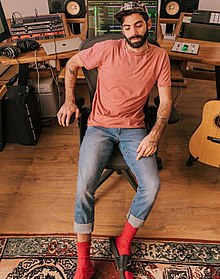Stav Beger
Stav Beger סתיו ברגר | |
|---|---|
 | |
| Background information | |
| Born | 21 October 1991 Dor, Israel |
| Genres | Pop |
| Years active | 2015–present |
Stav Beger (Hebrew: סתיו בגר; born 21 October 1991) is an Israeli record producer, arranger, composer, songwriter and artistic director.
Career
[edit]At his career's beginning, Beger worked as recording engineer for Israeli musician Yinon Yahel. In 2015 he helped him to produce Israel's Eurovision 2015 song "Golden Boy".[1] Starting his independent career as a record producer and composer, Beger produced Israeli rapper Talisman's hit "Zanzibar" in 2016, which reached the top of Galgalatz's weekly chart.[2]
In 2018, he wrote and produced Omer Adam's biggest hit "Shney Meshugaim", which reached the top of Media Forest's chart and got more than 7 million streams on Spotify, becoming the most-streamed Hebrew song on the platform.[3][4] At the same year, Beger wrote and produce Israel's 2018 Eurovision-winning song by Netta Barzilai, "Toy", with Doron Medalie,[5] winning Society of Authors, Composers and Music Publishers in Israel prizes for "extraordinary achievement in the international arena" and "arranger of the year".[6][7]
In 2019, Beger co-wrote the songs "Bassa Sababa" and "Nana Banana" by Netta Barzilai.[8] At the same year, he produced "Katov Mi'lemala" by Idan Raichel, which reached the top of Media Forest's weekly chart.[9]
In 2020, he wrote with Nathan Goshen the song "Roots" by Eden Alene, one of the four nominated songs to represent Israel in the Eurovision Song Contest 2020.[10] At the same year, he produced Goshen's sixth album, Bati Lachlom, which got many praises.[11]
In 2023, Beger joins Yinon Yahel, Tal Forer, Amit Shine and Oudi Antebi to start Session42,[12] an Israeli based music label and music tech company. Session42 is the management company and label behind Eden Golan.
He co-authored the 2024 song "Hurricane", who represented Israel in the Eurovision Song Contest 2024.
References
[edit]- ^ "The song that Netta Barzilai will sing in the Eurovision Song Contest chosen". mako. 25 February 2018. Retrieved 29 February 2020.
- ^ ""Kmo She'ani": New song by Talisman". mako. 14 March 2017. Retrieved 29 February 2020.
- ^ "Spotify concludes 2018: What is the most streamed song in Israel and worldwide?". Giraffe (in Hebrew). 7 December 2018. Retrieved 29 February 2020.
- ^ "Eyal Golan is the most played singer on this decade. The most played song: "Mehuzakim Le'Olam" by Avraham Tal". Walla! News (in Hebrew). 18 December 2019. Retrieved 29 February 2020.
- ^ "Eurovision Israel: Doron Medalie releases demo version for Toy - ESCToday.com". Eurovision News, Polls and Information by ESCToday. 14 May 2018. Retrieved 29 February 2020.
{{cite web}}: CS1 maint: url-status (link) - ^ "ACUM prizes: Lifetime to Fortis and Shakharof, song of the Year of Eden Hason". Walla! News (in Hebrew). 27 May 2019. Retrieved 13 August 2020.
- ^ "I Won". ynet (in Hebrew). 18 May 2018. Retrieved 14 August 2020.
- ^ "Nana Banana: New song by Netta Barzilai". ynet (in Hebrew). 10 May 2019. Retrieved 29 February 2020.
- ^ tool, niv the. "המצעד השבועי של מדיה פורסט". mediaforest-group. Retrieved 13 August 2020.
- ^ "Eden Alene Songs for Israel in Eurovision 2020". wiwibloggs. 27 February 2020. Retrieved 29 February 2020.
- ^ "He came to dream: Nathan Goshen touches on weaknesses, cracks and internal fractures". Ma'ariv. Retrieved 13 August 2020.
- ^ ""אם כל שיר הוא סטארט־אפ, אנחנו קרן ההון סיכון" | כלכליסט". calcalist (in Hebrew). 6 August 2022. Retrieved 27 April 2024.
